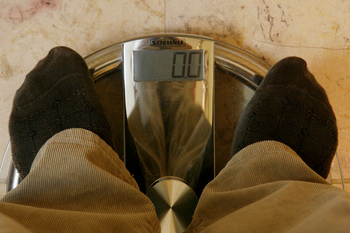University of Michigan study finds cash incentives work to motivate weight loss
Though weight loss programs in the workplace may seem excessive, a recent study conducted by the University of Michigan Health System and the VA Ann Arbor Healthcare System found that under certain conditions they can be successful, Glamour reported.

Photo from Flickr user dsearls.
The pairing led to nearly three times more weight loss than in individuals that were offered cash rewards merely on individual performance, according to the report.
The University of Michigan pays $100 to each of its employees enrolled in its health care benefits who participate in online wellness programs.
Amy Biolchini covers Washtenaw County, health and environmental issues for AnnArbor.com. Reach her at (734) 623-2552, amybiolchini@annarbor.com or on Twitter.


Comments
GoNavy
Fri, Apr 5, 2013 : 9:13 p.m.
Did anybody else notice that the scale in the picture isn't working? Who weights 0.0 lbs? Or is the person on the scale so heavy that the device registers an error?
BhavanaJagat
Fri, Apr 5, 2013 : 4:56 p.m.
Cash Incentives at Workplace: At the University of Michigan, there are cash incentives for individual performance and for group performance as peer pressure is a big factor. Under peer pressure, individuals at the University of Michigan find the necessary incentive to apply for research grants, and the compulsion to obtain research grants has been a great driving force to search for topics that deserve to be further studied. The University gets the benefit of getting fatter with all the research dollars that flow into its coffers. I can see the bulge on the University's middle while they research on the efficacy of weight loss programs.
Doug
Fri, Apr 5, 2013 : 3:01 p.m.
Does the study mean that money trumps the threat of an early death?
justcurious
Fri, Apr 5, 2013 : 1:36 p.m.
It's a no brainer, but it has to be a lifestyle, not a diet. 1. Stop watching commercial television with all of the food ads. 2. Stop eating processed food. 3. Stop eating wheat, most dairy and soy. 4. Eat lots of whole fruits and vegetables. 5. Eat real butter, not fake spreads. 6. Use only olive oil and coconut oil in cooking, no vegetable oils. 6. Eat meat, fish and poultry in moderation. 7. Eat whole eggs. 8. Cut down on salt. 9. NEVER drink soft drinks. 10. Try to only eat foods that don't require a label. 11. Have and enjoy a cheat meal now and then. 12. Write down what you eat for at least 6 months. 13. Don't weigh yourself constantly. 14. Take note of how much better you feel physically AND mentally. 15. Watch the pounds drop off and be proud that you are finally doing this. What you eat is 90%, exercise is only 10% of a healthy lifestyle.
Simon Green
Fri, Apr 5, 2013 : 12:43 p.m.
Must have been a stimulus-funded study. It's about as compelling as filming shrimp on a treadmill.
tim
Thu, Apr 4, 2013 : 11:39 p.m.
Do you have to pay the money back if you regain the weight? Losing weight is just he beginning of a life long process. I'm not impressed by people that lose weight, but I am impressed by people that lose it and keep it off for the rest of their lives.
GoNavy
Fri, Apr 5, 2013 : 11:58 a.m.
Absolutely true tim. We celebrate those who do the "250-->165 transformation," but little is said about those individuals who get up 4 days a week, for years on end, and head to the gym or go running. Staying in shape is a way of life.
seldon
Fri, Apr 5, 2013 : 2:04 a.m.
Only 5% of them keep it off for 5 years or more, so you don't have to worry about being impressed very often.
EyeHeartA2
Fri, Apr 5, 2013 : 12:53 a.m.
So....you report out at funerals? or how does that "rest of their life" thing work? BTW, have you been able to stay at a healthy weight for the "rest of your life"? When do we get to find out?
Paul
Thu, Apr 4, 2013 : 9:39 p.m.
Ah duh, who would go to work everyday if they did not get paid ? They really did a study on this ?
GoNavy
Fri, Apr 5, 2013 : 11:57 a.m.
Somebody has to figure out why 2/3 of Americans are overweight/obese and can't/won't seem to do anything about it.
blue85
Thu, Apr 4, 2013 : 11:06 p.m.
"The pairing led to nearly three times more weight loss than in individuals that were offered cash rewards merely on individual performance, according to the report." The above is why they did the study: 1) do incentives/disincentives work on their own?; 2) do they work better when monetary is paired with non-monetary; 3) what are the proper proportions for each type of reward?; 4) what is the appropriate timing? When studies like this are done, they are done to a methodology with controls and in order to create error bars and differential components analysis. Merely reading the above doesn't tell the whole story. If you doubt the study, why not go back to the source document? Read the methodology and conclusions. If you find either wanting, send a note to the research team...they tend to be pretty responsive to appropriate comments.